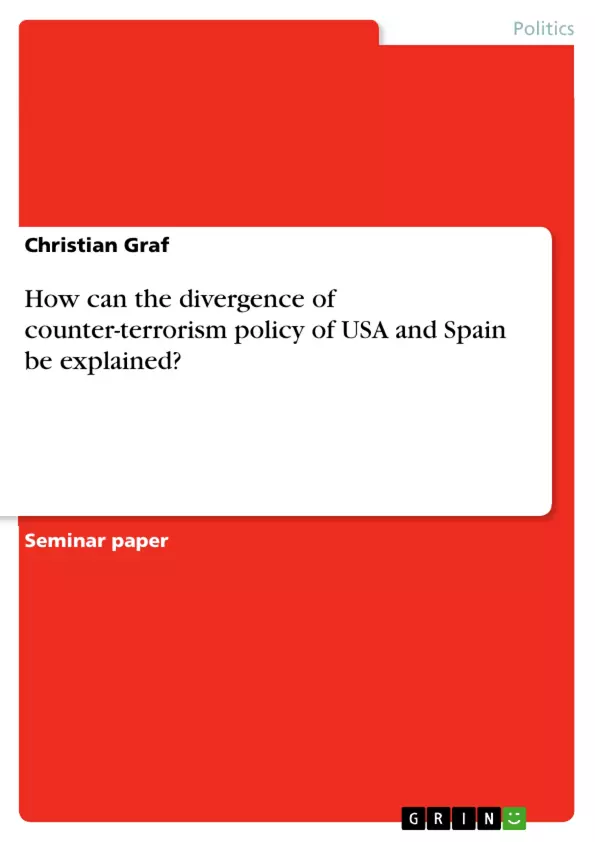To deal with terrorism, a state needs to arm and secure itself for its defense against it, because they are existing threats. Extraordinary measures, which are nothing else than counter-terrorism policies, are important and necessary for fighting against terrorism in order to be secure. The fact that terrorism occurs worldwide and is becoming more important for states it is necessary to have effective counter-terrorism policies. But states response differently towards threats and especially to terrorism acts. The interesting question that will be discussed is: how can the divergence of counter- terrorism policy be explained?
Terrorism as a threat primarily to states can occur internationally or domestically, and by defining terrorism, a state can respond to and combat terrorism in its own way, and this can be a potential factor for explaining a divergence of counter.-terrorism policy, but this will be not the emphasis of this term paper. The theoretical framework for explaining a divergence of counter- terrorism policy is the theory of securitization by Barry Buzan, Ole Waever and Jaap de Wilde, which contains assumptions of the theory of social constructivism. Inasmuch social constructivism by Alexander Wendt tells something about political culture. It neither tells much about security nor how to deal with threats especially to terrorism acts; that is why a widening analysis for the term security is needed in order to explain a divergence of counter-terrorism policy and the theory of securitization. Theory of securitization exactly explains everything about how a security term becomes a relevant issue. The frame for securitization, as written before, are core assumptions of social constructivism and those are necessary to discuss, in order to understand further explanations. This is why this term paper begins with the theoretical framework of constructivism. After the theoretical framework has been discussed, two states as empirical examples, which are the USA and Spain, shall give a better view of how states differs from their counter-terrorism policies, regarding to their different facing on terrorism acts, that are taken place. At the end, a conclusion shall repeat the core assumptions of the theoretical framework and explanations and in addition gives further impulses on other fields of analysis.
Inhaltsverzeichnis (Table of Contents)
- Introduction
- Theoretical frameworks
- Core assumptions of social constructivism
- Copenhagen School with the theory of securitization
- Empirical Examples
- Political culture and counter-terrorism of USA after 9/11
- Political culture and counter-terrorism of Spain after 11-M
- Explaining divergence of counter-terrorism policy of USA and Spain
- Conclusion
- References
Zielsetzung und Themenschwerpunkte (Objectives and Key Themes)
This term paper examines the divergence of counter-terrorism policy between the USA and Spain, analyzing the factors that contribute to their distinct approaches. The study utilizes the theory of securitization by Barry Buzan, Ole Waever, and Jaap de Wilde, which is rooted in social constructivist assumptions, to understand the dynamics of state responses to terrorism.
- The role of political culture in shaping counter-terrorism policies
- The theory of securitization as a framework for explaining divergent state responses
- The influence of social constructivism in understanding state identity and interests
- The impact of historical events and societal experiences on counter-terrorism strategies
- The significance of cultural and ideological differences in shaping national security priorities
Zusammenfassung der Kapitel (Chapter Summaries)
- Introduction: This chapter introduces the topic of counter-terrorism policy and its divergence between states, specifically focusing on the USA and Spain. It highlights the importance of effective counter-terrorism measures in response to the global threat of terrorism and sets the stage for the theoretical framework and empirical analysis that follow.
- Theoretical Frameworks: This chapter delves into the core assumptions of social constructivism, highlighting the role of state identity, interests, and the ideational structure in shaping state behavior. It introduces the theory of securitization as a tool for analyzing how security issues are constructed and addressed by states.
- Empirical Examples: This chapter examines the political culture and counter-terrorism policies of both the USA and Spain. It analyzes how historical events, such as 9/11 and 11-M, have shaped their respective approaches to combating terrorism.
Schlüsselwörter (Keywords)
This research focuses on the divergence of counter-terrorism policy, exploring key themes such as social constructivism, securitization theory, political culture, state identity, and the impact of historical events on national security strategies. The study examines the cases of the USA and Spain, analyzing their distinct responses to terrorism in the context of their unique political and social contexts.
Frequently Asked Questions
Why do counter-terrorism policies differ between the USA and Spain?
The divergence is explained by differences in political culture, national identity, and the specific historical experiences of each state, such as the impact of the 9/11 attacks in the USA and the 11-M attacks in Spain.
What is the "Theory of Securitization"?
Developed by the Copenhagen School (Buzan, Waever, de Wilde), it explains how a specific issue is constructed as an existential threat through "speech acts," allowing for extraordinary measures beyond normal political procedures.
How does Social Constructivism relate to security policy?
Social constructivism suggests that state interests and identities are not fixed but are shaped by ideational structures and political culture, which in turn influence how a state responds to terrorism.
What was the significance of 11-M for Spain's security strategy?
The 11-M train bombings in Madrid significantly shaped Spain's political culture and its approach to counter-terrorism, leading to a strategy distinct from the US response to 9/11.
Can counter-terrorism be understood through a state's identity?
Yes, the paper argues that a state's unique identity and ideological background determine its national security priorities and the specific measures it takes to combat threats.
- Quote paper
- Christian Graf (Author), 2012, How can the divergence of counter-terrorism policy of USA and Spain be explained?, Munich, GRIN Verlag, https://www.grin.com/document/278819



